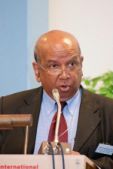Symposium "Climate Change, Water Stress, Conflict and Migration"

The Hague, 21 September, 2011
On 21 September - the International Day of Peace - the Dutch foundation Alliance for the University for PEACE (UPEACE) organised a symposium on climate change as one of the causes of conflicts and migration in various parts of the world.
The event, held at the International Institute of Social Studies in The Hague focused on the impacts of climate change on water: longer and more intensive droughts as is occurring in the Horn of Africa, severe floods as now taking place (again!) in Pakistan, loss of territory and salininization of agricultural land by sea level rise as is happening already for years now in Bangladesh, Vietnam, the area around Jakarta, and the imminent disappearance of small island states in the Indian Ocean (Maldives) and the Pacific (Kiribati, Tuvalu and many others). Very problematic is the melting of the glaciers on the Tibetan Plateau, which feed the rivers on which billions of people in Pakistan, India, Bangladesh, Laos, Cambodia, Thailand, Vietnam and China depend for their water supply.
The symposium, organised in close cooperation with and with support from the Dutch Ministry of Foreign
Affairs, Cordaid, the Netherlands National Commission for UNESCO, WWF Netherlands, the International
Institute of Social Studies and the Institute for Environmental Security dealt with concrete experiences, the interdependencies between climate change, water, conflict and migration, and also aimed to formulate recommendations for present and future problems.
Gen. (ret) Muniruzzaman, President of the Bangladesh Institute of Peace and Security Studies (and member of the IES Military Advisory Council on Climate Change and International Security) spoke on the security risks in his part of the world. One of the problems concerns the status of 'climate migrants' who had to leave their country. They cannot or only with difficulty be seen as refugees in the sense of the 1951 Geneva Refugee Convention which relates to people who had to flee their country because of political, ethnic or religious reasons, but they will have to be able to count on the support of the international community.
Other problems discussed were the greater vulnerability of women and children for water stress caused by climate change, the importance of timely reactions by authorities to early warning messages on e.g. coming droughts, and ways to deal with emergency situations which are understandable for the local communities.